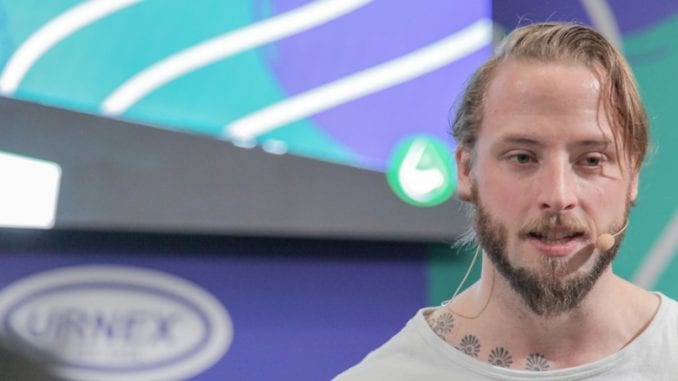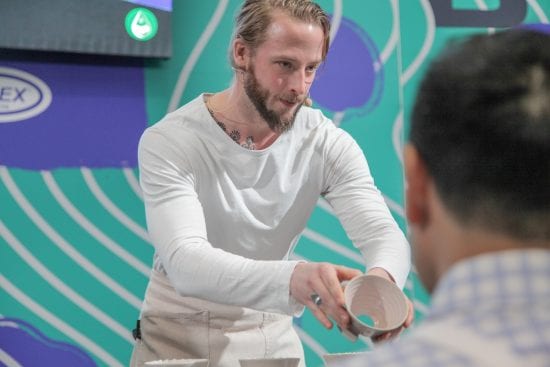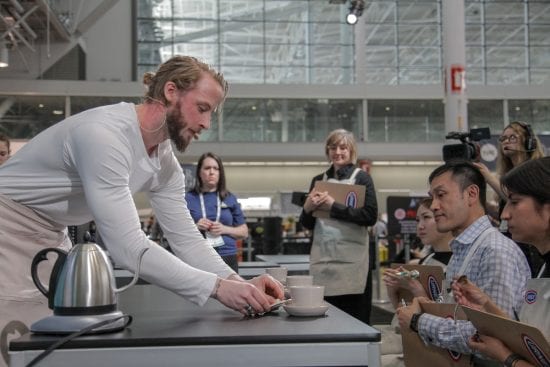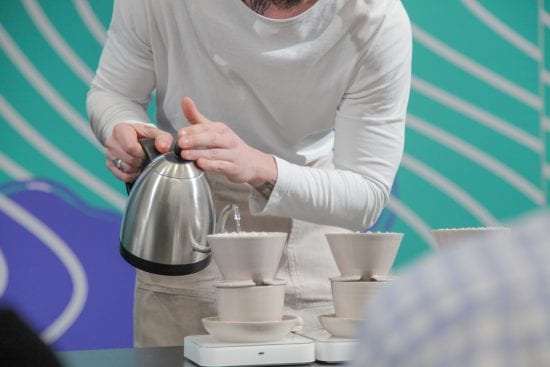
Patrik Rolf, the 2019 World Brewers Cup runner-up from Sweden discusses how he got into coffee, developing his own coffee brewer, and how another competitor inspired him to find his 2019 competition coffee.
BY CHRIS RYAN
BARISTA MAGAZINE ONLINE
Photos by Shaunté Glover for World Coffee Events
Patrik Rolf put a lot of hours into this year’s World Brewers Cup Championship routine—how many, he can’t be sure. There was the time spent traveling to the da Tota Farm in Costa Rica’s Tarrazu region to get to know more about his competition coffee. There was the brewing device, the April brewer, that he spent countless hours developing for his business, April Coffee Roasters, and used for competition. And then there was the considerable time he spent practicing his routine over and over to get it just right.
All the hard work paid off for Patrik, as the competitor from Sweden made an impressive run at the World Brewers Cup in Boston in April. (You can find out more about his competition experience in this video series.) We talked to Patrik about putting together his Brewers Cup routine, what he likes about competing, and much more.

Chris Ryan: How and when did you start working in the coffee industry, and what drew you to the coffee world?
Patrik Rolf: I started as a consultant working with business-related processes in a local specialty coffee roastery, da Matteo, back in my hometown of Gothenburg. During that time I got introduced to specialty coffee by the company’s founder, Matts W. Johansson. If it wasn’t for him, I would never have started. It came at a time where I was looking for a craft—something authentic that would allow me to get my hands dirty.
How long have you been taking part in coffee competitions? What do you like about competing?
I have competed in some capacity for a long time. I actually participated in the Swedish Barista Championship before I started with coffee, as a fun challenge. I have been focusing on the Brewers Cup Championship, and I also did Coffee Masters in London. Competitions are the best opportunity to learn and progress in this industry. Everyone should do it because when done right it makes you better.

Can you tell me about your roastery April? How long have you been open and what’s your mission with it?
April is on its third year, based in Copenhagen, Denmark, and the goal is to set the bar for quality in the top segment of the specialty coffee roastery. We are a small company—today we have three employees—and we spend a lot of our time trying to share our experience with the ambition of assisting other professionals as much as we can.

Can you tell me about how your World Brewers Cup Championship routine came together, with visiting the farm in Tarrazu and wanting to share their Gesha? What was so exciting about this coffee?
The story started with Mathieu Theis, part founder and owner of MAME in Zurich and one of the best barista competitors I have seen. I tried his coffee last year in Amsterdam during the (World Barista Championship), and it was something completely new—flavor notes packed with cinnamon and orange. I knew right then and there that I had to learn more, so I got in contact with the processing station that produced his coffee and Mr. Esteban introduced me to Chango and the da Tota Farm. It truly is the best coffee I ever had.

Why did you decide to create your own brew method for Brewers Cup, and how did the flat-bed drip brewer bring out the best in the coffee? Can you describe the process of actually creating and making the brewer?
Brewing for me is about exploring how we can make tastier coffee. I never liked the idea of having to be confined to brewing systems that someone else created, which in turn is based on my belief that how you roast a coffee dictates how it should be brewed. The April brewer was not designed to compete with, it’s designed to make our coffee at April taste the way we want to on a daily basis.
It’s been a long process, with many rounds of different models. But I have had some really good help, and over time I felt we had a version that was good enough to bring to the worlds.

For me, it’s important that I’m focused on the brewing aspect of the competition. Most competitors still do very similar things. Again, we compete to learn. Doing something that has already been done is not the best way to learn.
What did you learn from your World Brewers Cup experience?
The main lesson is that I need to practice smarter for next year, get more diverse in my approach and more in tune with the calibration of the judges. Overall I learned a lot; being backstage with other competitors on a world level is very inspiring. It makes me hopeful for the future of the industry.
Do you have any advice for coffee competitors?
Focus on learning and keep it authentic. It’s great to see a lot of competitors working with coaches around the world, but coaching or having a coach is not about “copying” others; it should be about finding your own voice. There is always someone who will practice more, smarter, and harder than you, and if you are up against that person, you will most likely not win. So make sure you are the one who puts in the most effort.

